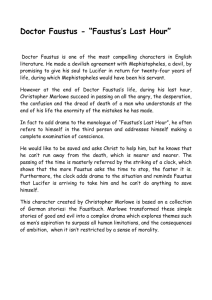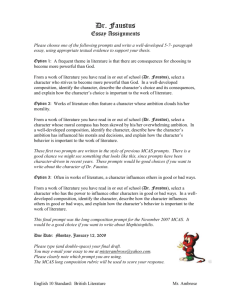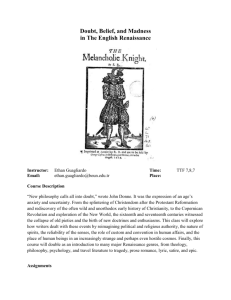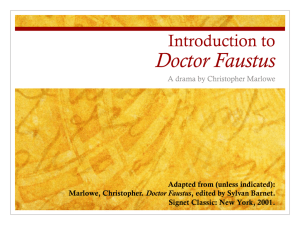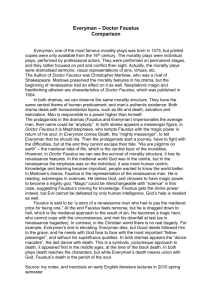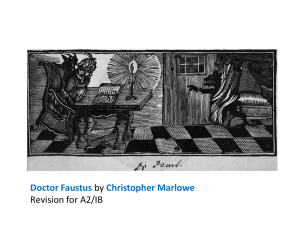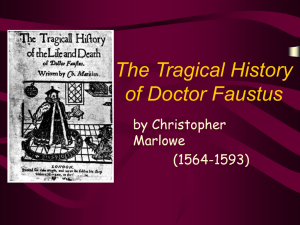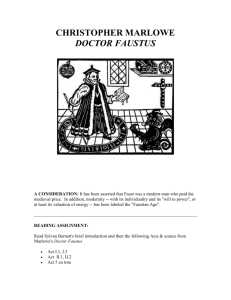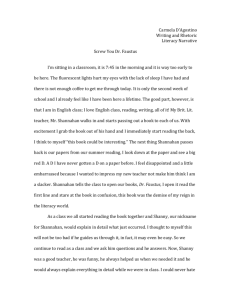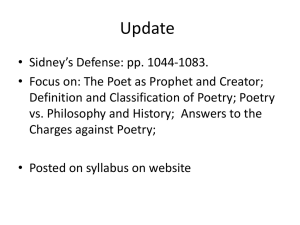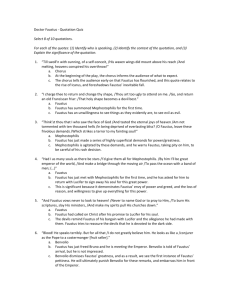Christopher Marlowe's - St. Thomas University
advertisement
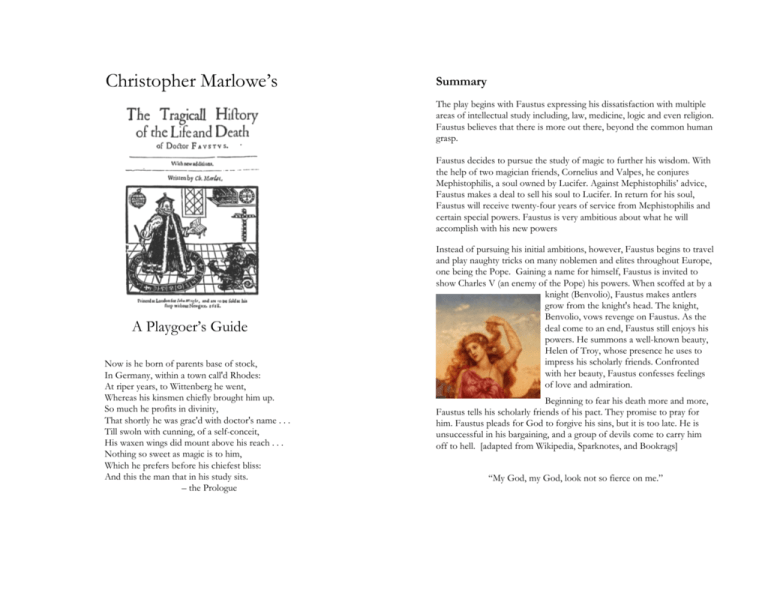
Christopher Marlowe’s Summary The play begins with Faustus expressing his dissatisfaction with multiple areas of intellectual study including, law, medicine, logic and even religion. Faustus believes that there is more out there, beyond the common human grasp. Faustus decides to pursue the study of magic to further his wisdom. With the help of two magician friends, Cornelius and Valpes, he conjures Mephistophilis, a soul owned by Lucifer. Against Mephistophilis’ advice, Faustus makes a deal to sell his soul to Lucifer. In return for his soul, Faustus will receive twenty-four years of service from Mephistophilis and certain special powers. Faustus is very ambitious about what he will accomplish with his new powers A Playgoer’s Guide Now is he born of parents base of stock, In Germany, within a town call'd Rhodes: At riper years, to Wittenberg he went, Whereas his kinsmen chiefly brought him up. So much he profits in divinity, That shortly he was grac'd with doctor's name . . . Till swoln with cunning, of a self-conceit, His waxen wings did mount above his reach . . . Nothing so sweet as magic is to him, Which he prefers before his chiefest bliss: And this the man that in his study sits. – the Prologue Instead of pursuing his initial ambitions, however, Faustus begins to travel and play naughty tricks on many noblemen and elites throughout Europe, one being the Pope. Gaining a name for himself, Faustus is invited to show Charles V (an enemy of the Pope) his powers. When scoffed at by a knight (Benvolio), Faustus makes antlers grow from the knight's head. The knight, Benvolio, vows revenge on Faustus. As the deal come to an end, Faustus still enjoys his powers. He summons a well-known beauty, Helen of Troy, whose presence he uses to impress his scholarly friends. Confronted with her beauty, Faustus confesses feelings of love and admiration. Beginning to fear his death more and more, Faustus tells his scholarly friends of his pact. They promise to pray for him. Faustus pleads for God to forgive his sins, but it is too late. He is unsuccessful in his bargaining, and a group of devils come to carry him off to hell. [adapted from Wikipedia, Sparknotes, and Bookrags] “My God, my God, look not so fierce on me.” Two versions The Theatre The St. Thomas Early English Drama Society have chosen to perform the script published by John Wright, known as the “B” script. Elizabethan theatre refers to plays written and performed in England during the reign of Queen Elizabeth I, between the years 1558-1603. More generally, a play is often considered to be “Elizabethan” in nature if it was written or performed between the social reformation of the Catholic church during the 16th century in England and the closure of the theatres in England in 1642. The version termed “A” was printed and edited in 1604. The title page for this text attributes the play to “Ch. Marl.” It is 1485 lines long, which is considered to be relatively short for an English Renaissance play. The 1616 “B” version omits 36 lines, but adds 676 new lines, making it quite a bit longer than the “A” (1604) version. There are small changes of wording in this text – for example, "Never too late, if Faustus can repent" in the 1604 version, was changed to "Never too late, if Faustus will repent" in 1616. This small word change changes the perception of hope for Faustus' repentance, if he “will” implies that he can, whereas in the 1604 version, we are less sure that he is able. Marlowe’s plays, also like Shakespeare’s, would have been performed “in the round,” with virtually no scenery, and by entirely male casts (women were not allowed on stage during this period). There is disagreement surrounding which version is closer to Christopher Marlowe's original. It is argued that the 1604 version is an abbreviated version of Marlowe's work, and also that the 1616 version is a posthumous adaption. [Drawn from Wikipedia, an article by P. J. Croft in The Review of English Studies, and the “Perseus Project” digital library] The Author As with his contemporary William Shakespeare, little is known about Christopher Marlowe’s life. It is known that he was born on February 6th, 1564, to a shoemaker in Canterbury. He attended The King’s School in Canterbury, and Corpus Christi College in Cambridge. His first play, Dido, Queen of Carthage, is believed to have been written with Thomas Nashe while Marlowe was still attending Cambridge. There are many rumors around Christopher Marlowe’s life. The most famous is that he may have been a government spy. His own death is linked to this theory. Other rumors concerning Marlowe involve him being a heretic. In May of 1593, anti-Protestant bills, written in blank verse, and featuring allusions to Marlowe’s plays, were posted in London. Before he could be arrested, Marlowe was murdered in Deptford. There is also a conspiracy theory that suggests that Marlowe faked his own death, and continued to write under the name of “William Shakespeare.” This guide was researched by The Doctor Faustus Task Force Jeff Dingle, Cody Dobbelsteyn, and Tiffany Robertson and assembled and edited by Melanie Perry, Tiffany Robertson, and Russ Hunt St. Thomas University English 2223: The Page and the Stage visit our Web site, at: http://people.stu.ca/~hunt/22230607/
